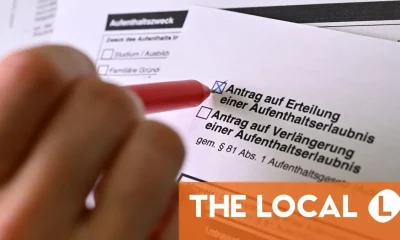Bürgergeld and other unemployment benefits are is to be reformed (read cut) in order to save money, according to statements made by Chancellor Friedrich Merz to ARD in a televised interview on Sunday.
Specifically, Merz spoke in favour of noticeable cuts to Bürgergeld, including potentially enforcing a cap on payments towards rent.
“It should be called basic security (Grundsicherung) and no longer citizen’s money (Bürgergeld)…” Merz said, adding that he envisions the government saving more than one or two billion euros via cuts to welfare cash benefits.
Federal Labour Minister Bärbel Bas (SPD) reportedly wants to present a draft for a Bürgergeld reform after the summer break.
What would a Bürgergeld reform look like?
Among the main points Merz addressed on camera were a cap on the amount of rental costs that can be covered, as wekk as adjustments intended to stop people from collecting unemployment money on top of undeclared or other part-time work.
A cap on rental costs could have a particular impact on people living in tight housing markets, such as in Berlin, Munich or other major cities, where housing costs are often high and more affordable options aren’t readily available
READ ALSO: Germans taking on personal debt at ‘nearly twice the European average’
The Chancellor also suggested that in some cases, like immediately after losing one’s job, he could imagine increasing the unemployment benefits rate in some cases.
Merz’ comments, taken along with similar comments from Federal Labour Minister Bärbel Bas (SPD), suggest a looming cuts to Germany’s welfare benefits system.
For her part, Bas has also spoken of a broad reorganisation of Bürgergeld to make it “more targeted and better at getting people into work”, according to a report by Merkur.de.
The Labour Minister has also spoken out in favour of stricter rules for welfare recipients, including sanctions for people who miss appointments at the job centre.
Advertisement
Welfare politicised
Germany’s long-valued welfare benefits, and Bürgergeld in particular, have become issues of political contention in recent months.
The far-right Alternative for Germany party has taken to pushing a narrative that immigrants in Germany are milking the country’s welfare system, despite evidence to the contrary.
READ ALSO: Fact-check – Are immigrants in Germany taking advantage of the welfare state?
It’s not surprising that the conservative Christian Union parties under Merz’ leadership are pushing for social welfare reforms, but exactly how far they will push remains to be seen.
The black-red government was confronted with a substantial hole in the federal budget as soon as it came to power, and having run on plans to cut certain taxes and raise spending on defence and infrastructure, they are limited in where they can look for potential savings.
But exactly which benefits will be capped or cut, and by how much, will ultimately come down to the compromises reached in debates between Merz’ conservatives and the centre-left Social Democrats (historically regarded as defenders of the welfare state).





































